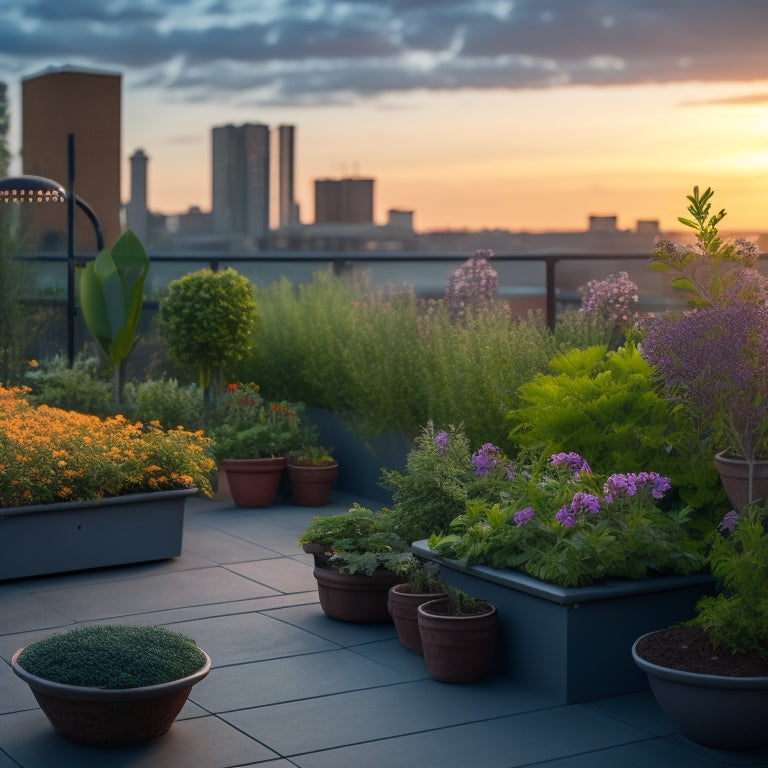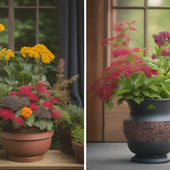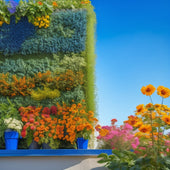
3 Essential Rooftop Irrigation Systems for Gardeners
Share
You're likely unaware that selecting the right rooftop irrigation system can greatly impact the health and sustainability of your rooftop garden, and that's why choosing from the three essential systems is vital. You can opt for drip irrigation, which delivers water directly to plant roots, promoting water conservation and healthy growth. Alternatively, sprinkler systems provide a holistic approach for urban farming, covering larger areas and diverse crops. For vertical gardening, micro irrigation offers precise water distribution, minimizing evaporation and runoff. By exploring these systems further, you'll reveal the full potential of your rooftop garden.
Key Takeaways
• Drip irrigation promotes water conservation and strong root development, making it a highly efficient option for rooftop gardens.
• Sprinkler systems provide a holistic approach to rooftop irrigation, ideal for larger areas and diverse crops in urban farming.
• Micro irrigation delivers precise amounts of water directly to plant roots, minimizing evaporation and runoff in vertical gardening.
• Regular maintenance is crucial for all rooftop irrigation systems, including inspecting tubes and replacing emitters.
• Smart technology integration in rooftop irrigation systems allows for remote monitoring and control, maximizing efficiency and convenience.
Drip Irrigation for Rooftop Gardens
When designing a rooftop irrigation system, you'll want to consider drip irrigation as a highly efficient option for delivering water directly to the roots of your rooftop garden's plants. This method promotes water conservation, as it reduces evaporation and runoff, allowing your plants to receive the precise amount of water they need.
Drip irrigation also enhances plant health by providing a consistent and targeted water supply, which encourages strong root development and healthy growth.
As a DIY gardener, you'll appreciate the ease of installation and maintenance that drip irrigation offers. With a few simple components, including tubes, emitters, and a water source, you can create a customized system that suits your rooftop garden's unique needs.
Regular maintenance tips include inspecting tubes for blockages, replacing worn-out emitters, and adjusting water pressure to ensure peak performance. By choosing drip irrigation, you'll enjoy a thriving rooftop garden while minimizing your water footprint and maximizing your freedom to focus on what matters most – nurturing your plants and enjoying the fruits of your labor.
Sprinkler Systems for Urban Farming
While drip irrigation excels in precision watering, sprinkler systems for urban farming offer a more holistic approach to rooftop irrigation, allowing you to cover larger areas and cater to a diverse range of crops. With sprinkler systems, you can irrigate bigger plots, making them ideal for urban farming projects. These systems are particularly useful when you need to water crops with varying watering requirements.
To maximize water efficiency, consider incorporating water-saving techniques, such as using low-flow sprinkler nozzles or scheduling your irrigation sessions during cooler parts of the day.
Smart technology integration is also key, as it enables you to monitor and control your irrigation system remotely, ensuring that your crops receive the right amount of water at the right time.
When selecting a sprinkler system, look for features such as adjustable spray patterns, pressure-regulating devices, and corrosion-resistant materials. By choosing the right system and implementing water-saving strategies, you can create a thriving urban farm on your rooftop, while minimizing your water footprint.
With the right setup, you'll be enjoying a bountiful harvest in no time.
Micro Irrigation for Vertical Gardening
In vertical gardening, micro irrigation systems prove to be a game-changer, allowing you to deliver precise amounts of water directly to the roots of each plant, thereby minimizing evaporation and runoff. This targeted approach guarantees that each plant receives exactly what it needs, reducing waste and conserving water. By adopting micro irrigation, you'll be employing a water conservation technique that's essential for sustainable gardening practices.
As a vertical gardener, you're already reaping the benefits of increased yields and space efficiency. Micro irrigation takes these advantages to the next level by providing a precise, controlled environment for your plants to thrive. By delivering water directly to the roots, you'll encourage healthy growth, reduce soil erosion, and minimize the risk of overwatering.
With micro irrigation, you'll be able to monitor and adjust water distribution in real-time, giving you complete control over your garden's hydration needs. By combining vertical farming advantages with micro irrigation, you'll be able to create a highly efficient, water-conscious garden that produces bountiful harvests while minimizing its ecological footprint.
Frequently Asked Questions
Can Rooftop Irrigation Systems Be Installed on Sloping or Uneven Roofs?
You can install rooftop irrigation systems on even the most ridiculously steep or uneven roofs, as long as you choose the right roofing materials and installation experts who can implement clever drainage solutions and maintenance plans.
How Do I Prevent Waterlogging in My Rooftop Garden's Soil?
To prevent waterlogging, you'll want to maintain proper soil aeration and drainage in your rooftop garden. Adjust your watering frequency and techniques, avoiding overwatering, and consider incorporating a drainage layer to keep your soil healthy and thriving.
Are Rooftop Irrigation Systems Compatible With Solar Panels?
You're likely aware that 70% of the world's surface is water, but did you know that 70% of rooftop space is wasted? You can maximize this space by positioning solar panels to optimize efficiency, without compromising rooftop garden aesthetics and design.
Do I Need to Winterize My Rooftop Irrigation System?
You'll want to winterize your rooftop irrigation system to prevent damage from freezing temperatures; create a maintenance schedule to drain hoses, insulate exposed pipes, and store equipment to guarantee a hassle-free spring startup.
Can I Use Harvested Rainwater With My Rooftop Irrigation System?
You can use harvested rainwater with your rooftop irrigation system, but consider the benefits of reduced water bills and independence from municipal supplies, as well as drawbacks like potential contamination and maintenance needs.
Related Posts
-

10 Essential Soil Tips for DIY Planters
You can greatly improve your DIY planter's chances of success by understanding and implementing the essential soil ti...
-

10 Essential Soil Tips for DIY Planters
You can greatly improve your DIY planter's chances of success by understanding and implementing the essential soil ti...
-

10 Essential Soil Tips for DIY Planters
You can greatly improve your DIY planter's chances of success by understanding and implementing the essential soil ti...
-

10 Essential Soil Tips for DIY Planters
You can greatly improve your DIY planter's chances of success by understanding and implementing the essential soil ti...
-

10 Essential Soil Tips for DIY Planters
You can greatly improve your DIY planter's chances of success by understanding and implementing the essential soil ti...
-

10 Essential Soil Tips for DIY Planters
You can greatly improve your DIY planter's chances of success by understanding and implementing the essential soil ti...
-

10 Essential Soil Tips for DIY Planters
You can greatly improve your DIY planter's chances of success by understanding and implementing the essential soil ti...
-

10 Essential Soil Tips for DIY Planters
You can greatly improve your DIY planter's chances of success by understanding and implementing the essential soil ti...
-

10 Essential Soil Tips for DIY Planters
You can greatly improve your DIY planter's chances of success by understanding and implementing the essential soil ti...
-

10 Essential Soil Tips for DIY Planters
You can greatly improve your DIY planter's chances of success by understanding and implementing the essential soil ti...
-

10 Essential Soil Tips for DIY Planters
You can greatly improve your DIY planter's chances of success by understanding and implementing the essential soil ti...
-

10 Essential Soil Tips for DIY Planters
You can greatly improve your DIY planter's chances of success by understanding and implementing the essential soil ti...
-

10 Essential Soil Tips for DIY Planters
You can greatly improve your DIY planter's chances of success by understanding and implementing the essential soil ti...
-

10 Essential Soil Tips for DIY Planters
You can greatly improve your DIY planter's chances of success by understanding and implementing the essential soil ti...
-

10 Essential Soil Tips for DIY Planters
You can greatly improve your DIY planter's chances of success by understanding and implementing the essential soil ti...
-

10 Essential Soil Tips for DIY Planters
You can greatly improve your DIY planter's chances of success by understanding and implementing the essential soil ti...
-

10 Essential Soil Tips for DIY Planters
You can greatly improve your DIY planter's chances of success by understanding and implementing the essential soil ti...
-

10 Essential Soil Tips for DIY Planters
You can greatly improve your DIY planter's chances of success by understanding and implementing the essential soil ti...
-

10 Essential Soil Tips for DIY Planters
You can greatly improve your DIY planter's chances of success by understanding and implementing the essential soil ti...
-

10 Essential Soil Tips for DIY Planters
You can greatly improve your DIY planter's chances of success by understanding and implementing the essential soil ti...
-

10 Essential Soil Tips for DIY Planters
You can greatly improve your DIY planter's chances of success by understanding and implementing the essential soil ti...
-

10 Essential Soil Tips for DIY Planters
You can greatly improve your DIY planter's chances of success by understanding and implementing the essential soil ti...
-

10 Essential Soil Tips for DIY Planters
You can greatly improve your DIY planter's chances of success by understanding and implementing the essential soil ti...
-

10 Essential Soil Tips for DIY Planters
You can greatly improve your DIY planter's chances of success by understanding and implementing the essential soil ti...
-

10 Essential Soil Tips for DIY Planters
You can greatly improve your DIY planter's chances of success by understanding and implementing the essential soil ti...
-

10 Essential Soil Tips for DIY Planters
You can greatly improve your DIY planter's chances of success by understanding and implementing the essential soil ti...
-

10 Essential Soil Tips for DIY Planters
You can greatly improve your DIY planter's chances of success by understanding and implementing the essential soil ti...
-

10 Essential Soil Tips for DIY Planters
You can greatly improve your DIY planter's chances of success by understanding and implementing the essential soil ti...
-

10 Essential Soil Tips for DIY Planters
You can greatly improve your DIY planter's chances of success by understanding and implementing the essential soil ti...
-

10 Essential Soil Tips for DIY Planters
You can greatly improve your DIY planter's chances of success by understanding and implementing the essential soil ti...
-

10 Essential Soil Tips for DIY Planters
You can greatly improve your DIY planter's chances of success by understanding and implementing the essential soil ti...
-

10 Essential Soil Tips for DIY Planters
You can greatly improve your DIY planter's chances of success by understanding and implementing the essential soil ti...
-

10 Essential Soil Tips for DIY Planters
You can greatly improve your DIY planter's chances of success by understanding and implementing the essential soil ti...
-

10 Essential Soil Tips for DIY Planters
You can greatly improve your DIY planter's chances of success by understanding and implementing the essential soil ti...
-

10 Essential Soil Tips for DIY Planters
You can greatly improve your DIY planter's chances of success by understanding and implementing the essential soil ti...
-

10 Essential Soil Tips for DIY Planters
You can greatly improve your DIY planter's chances of success by understanding and implementing the essential soil ti...
-

10 Essential Soil Tips for DIY Planters
You can greatly improve your DIY planter's chances of success by understanding and implementing the essential soil ti...
-

What Makes Concrete Planters Perfect for Succulents
You've found that concrete planters offer the perfect combination of durability, drainage, and design versatility to ...
-

What Makes Concrete Planters Perfect for Succulents
You've found that concrete planters offer the perfect combination of durability, drainage, and design versatility to ...
-

What Makes Concrete Planters Perfect for Succulents
You've found that concrete planters offer the perfect combination of durability, drainage, and design versatility to ...
-

What Makes Concrete Planters Perfect for Succulents
You've found that concrete planters offer the perfect combination of durability, drainage, and design versatility to ...
-

What Makes Concrete Planters Perfect for Succulents
You've found that concrete planters offer the perfect combination of durability, drainage, and design versatility to ...
-

What Makes Concrete Planters Perfect for Succulents
You've found that concrete planters offer the perfect combination of durability, drainage, and design versatility to ...
-

What Makes Concrete Planters Perfect for Succulents
You've found that concrete planters offer the perfect combination of durability, drainage, and design versatility to ...
-

What Makes Concrete Planters Perfect for Succulents
You've found that concrete planters offer the perfect combination of durability, drainage, and design versatility to ...
-

What Makes Concrete Planters Perfect for Succulents
You've found that concrete planters offer the perfect combination of durability, drainage, and design versatility to ...
-

What Makes Concrete Planters Perfect for Succulents
You've found that concrete planters offer the perfect combination of durability, drainage, and design versatility to ...
-

What Makes Concrete Planters Perfect for Succulents
You've found that concrete planters offer the perfect combination of durability, drainage, and design versatility to ...
-

What Makes Concrete Planters Perfect for Succulents
You've found that concrete planters offer the perfect combination of durability, drainage, and design versatility to ...
-

What Makes Concrete Planters Perfect for Succulents
You've found that concrete planters offer the perfect combination of durability, drainage, and design versatility to ...
-

What Makes Concrete Planters Perfect for Succulents
You've found that concrete planters offer the perfect combination of durability, drainage, and design versatility to ...
-

What Makes Concrete Planters Perfect for Succulents
You've found that concrete planters offer the perfect combination of durability, drainage, and design versatility to ...
-

What Makes Concrete Planters Perfect for Succulents
You've found that concrete planters offer the perfect combination of durability, drainage, and design versatility to ...
-

What Makes Concrete Planters Perfect for Succulents
You've found that concrete planters offer the perfect combination of durability, drainage, and design versatility to ...
-

What Makes Concrete Planters Perfect for Succulents
You've found that concrete planters offer the perfect combination of durability, drainage, and design versatility to ...
-

What Makes Concrete Planters Perfect for Succulents
You've found that concrete planters offer the perfect combination of durability, drainage, and design versatility to ...
-

What Makes Concrete Planters Perfect for Succulents
You've found that concrete planters offer the perfect combination of durability, drainage, and design versatility to ...
-

What Makes Concrete Planters Perfect for Succulents
You've found that concrete planters offer the perfect combination of durability, drainage, and design versatility to ...
-

What Makes Concrete Planters Perfect for Succulents
You've found that concrete planters offer the perfect combination of durability, drainage, and design versatility to ...
-

What Makes Concrete Planters Perfect for Succulents
You've found that concrete planters offer the perfect combination of durability, drainage, and design versatility to ...
-

What Makes Concrete Planters Perfect for Succulents
You've found that concrete planters offer the perfect combination of durability, drainage, and design versatility to ...
-

What Makes Concrete Planters Perfect for Succulents
You've found that concrete planters offer the perfect combination of durability, drainage, and design versatility to ...
-

What Makes Concrete Planters Perfect for Succulents
You've found that concrete planters offer the perfect combination of durability, drainage, and design versatility to ...
-

What Makes Concrete Planters Perfect for Succulents
You've found that concrete planters offer the perfect combination of durability, drainage, and design versatility to ...
-

What Makes Concrete Planters Perfect for Succulents
You've found that concrete planters offer the perfect combination of durability, drainage, and design versatility to ...
-

What Makes Concrete Planters Perfect for Succulents
You've found that concrete planters offer the perfect combination of durability, drainage, and design versatility to ...
-

What Makes Concrete Planters Perfect for Succulents
You've found that concrete planters offer the perfect combination of durability, drainage, and design versatility to ...
-

What Makes Concrete Planters Perfect for Succulents
You've found that concrete planters offer the perfect combination of durability, drainage, and design versatility to ...
-

What Makes Concrete Planters Perfect for Succulents
You've found that concrete planters offer the perfect combination of durability, drainage, and design versatility to ...
-

What Makes Concrete Planters Perfect for Succulents
You've found that concrete planters offer the perfect combination of durability, drainage, and design versatility to ...
-

What Makes Concrete Planters Perfect for Succulents
You've found that concrete planters offer the perfect combination of durability, drainage, and design versatility to ...
-

What Makes Concrete Planters Perfect for Succulents
You've found that concrete planters offer the perfect combination of durability, drainage, and design versatility to ...
-

What Makes Concrete Planters Perfect for Succulents
You've found that concrete planters offer the perfect combination of durability, drainage, and design versatility to ...
-

What Makes Concrete Planters Perfect for Succulents
You've found that concrete planters offer the perfect combination of durability, drainage, and design versatility to ...
-

5 Tips for Thriving Vertical Vegetable Gardens
To thrive in vertical vegetable gardening, you'll want to choose a planter that meets the unique needs of your veggie...
-

5 Tips for Thriving Vertical Vegetable Gardens
To thrive in vertical vegetable gardening, you'll want to choose a planter that meets the unique needs of your veggie...
-

5 Tips for Thriving Vertical Vegetable Gardens
To thrive in vertical vegetable gardening, you'll want to choose a planter that meets the unique needs of your veggie...
-

5 Tips for Thriving Vertical Vegetable Gardens
To thrive in vertical vegetable gardening, you'll want to choose a planter that meets the unique needs of your veggie...
-

5 Tips for Thriving Vertical Vegetable Gardens
To thrive in vertical vegetable gardening, you'll want to choose a planter that meets the unique needs of your veggie...
-

5 Tips for Thriving Vertical Vegetable Gardens
To thrive in vertical vegetable gardening, you'll want to choose a planter that meets the unique needs of your veggie...
-

5 Tips for Thriving Vertical Vegetable Gardens
To thrive in vertical vegetable gardening, you'll want to choose a planter that meets the unique needs of your veggie...
-

5 Tips for Thriving Vertical Vegetable Gardens
To thrive in vertical vegetable gardening, you'll want to choose a planter that meets the unique needs of your veggie...
-

5 Tips for Thriving Vertical Vegetable Gardens
To thrive in vertical vegetable gardening, you'll want to choose a planter that meets the unique needs of your veggie...
-

5 Tips for Thriving Vertical Vegetable Gardens
To thrive in vertical vegetable gardening, you'll want to choose a planter that meets the unique needs of your veggie...
-

5 Tips for Thriving Vertical Vegetable Gardens
To thrive in vertical vegetable gardening, you'll want to choose a planter that meets the unique needs of your veggie...
-

5 Tips for Thriving Vertical Vegetable Gardens
To thrive in vertical vegetable gardening, you'll want to choose a planter that meets the unique needs of your veggie...
-

5 Tips for Thriving Vertical Vegetable Gardens
To thrive in vertical vegetable gardening, you'll want to choose a planter that meets the unique needs of your veggie...
-

5 Tips for Thriving Vertical Vegetable Gardens
To thrive in vertical vegetable gardening, you'll want to choose a planter that meets the unique needs of your veggie...
-

5 Tips for Thriving Vertical Vegetable Gardens
To thrive in vertical vegetable gardening, you'll want to choose a planter that meets the unique needs of your veggie...
-

5 Tips for Thriving Vertical Vegetable Gardens
To thrive in vertical vegetable gardening, you'll want to choose a planter that meets the unique needs of your veggie...
-

5 Tips for Thriving Vertical Vegetable Gardens
To thrive in vertical vegetable gardening, you'll want to choose a planter that meets the unique needs of your veggie...


